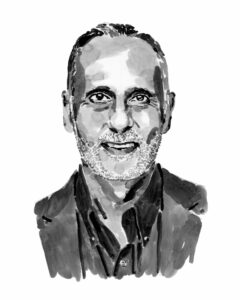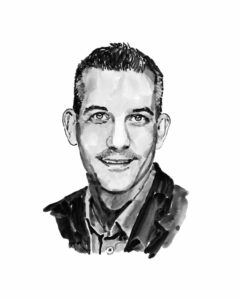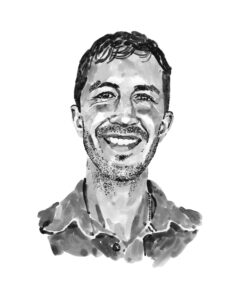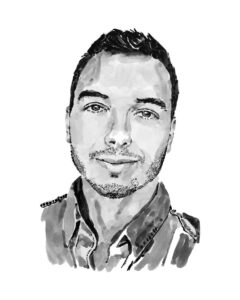Meet the team
Professor Mahmood Shivji
Center Director
Mahmood is professor of marine science at Nova Southeastern University’s Oceanographic Center in Florida and a director of the SOSF SRC. He received his undergraduate degree in biological sciences at Simon Fraser University in Canada, his MSc from the University of California, Santa Barbara, and his PhD from the University of Washington. He has been a faculty member at Nova Southeastern University since 1993 and a director of the SOSF SRC since 2010.
Mahmood credits his life-long fascination with biology to growing up in Kenya, where he was routinely exposed to African wildlife and undersea environments as a child and teenager. His interest in marine science in particular was boosted when as an undergraduate student he assisted one of his professors with kelp-bed ecology research in a pristine part of British Columbia. That experience proved transformative, leading to a career in marine and conservation science and education.
In addition to leading the research and education programmes of the SOSF SRC, Mahmood directs the Guy Harvey Research Institute, emphasising collaborative projects between the two entities to achieve larger and more impactful research and conservation outcomes. He specialises in integrating laboratory genetics-based and field-work approaches to study and solve problems pertaining to the management and conservation of sharks and rays, billfishes and coral reef ecosystems.
Mahmood’s work is on exhibit at the Smithsonian Museum’s Sant Ocean Hall in Washington DC, and his team’s research discoveries are frequently and widely reported in the national and international media.
Dr. Matthew Johnston
Associate Professor
Matt grew up in the beautiful Black Hills of South Dakota, where he spent his childhood fishing, camping, and enjoying all that the woods offer. Coming from a family of fishers and hunters, he spent a lot of time at mountain lakes and brooks and was often distracted by catching frogs, snakes, and minnows in the marshes when he should have been monitoring a fishing pole. His childhood dream to study the ocean and its inhabitants came from visits to a small roadside tourist attraction called ‘Marine Life Aquarium’, as well as from the home marine aquariums he attempted to maintain as a child.
Matt earned an undergraduate degree in information systems but changed career paths later in life to earn his PhD in marine biology and oceanography at Nova Southeastern University (NSU). Currently an assistant professor in the Department of Biological Sciences at NSU, he teaches various graduate and undergraduate courses, many of which focus on the integration of science and technology. He is also a researcher at the SOSF Shark Research Center, where his work involves computational biology as applied to investigating shark movement ecology and connectivity patterns of broadcast spawning marine species.
Matt lives on a small hobby farm in the country, raising chickens, parrots, and poodles. He also enjoys collecting fossils, many of which are relics of North America’s Western Interior Seaway.
Dr. Andrea Bernard
Research Scientist
Andrea grew up in Toronto, Canada, and spent many hours sailing on Lake Ontario. From a very young age, she has loved watery environments, dipping her toes into Ontario’s Muskoka lakes, Florida’s coastal waters, and even a neighbourhood pool. As a high school student, she travelled to Canada’s east coast and studied the great tides of the Bay of Fundy as part of a summer marine biology course, cementing her future career path to the study of aquatic science.
Andrea subsequently earned a Bachelor’s degree at the University of Guelph, Canada, studying marine and freshwater biology, and after graduating she interned at both the Department of Fisheries and Oceans Canada Great Lakes Laboratory located in Burlington, Ontario, where she studied everything from algae to fish habitat, and at the Mote Marine Laboratory & Aquarium in Florida, where she came face to face with a shark for the first time – and never forgot the experience! She then returned to university and completed a Master’s degree at the University of Guelph, investigating the population genetics of lake whitefish, followed by a doctorate at Nova Southeastern University (NSU), where she studied the population genetics of sharks, stingrays, and billfishes. She is currently an associate research scientist at NSU and the SOSF Shark Research Center, where she investigates the population dynamics of mainly sharks, with an emphasis on genetics and genomics-based ecology and conservation.
Dr. Jeremy Vaudo
Research Scientist
Jeremy grew up in coastal southern California exploring tidal pools and taking classes and volunteering at the local aquarium, so the decision to pursue marine biology was made at a very early age. After studying biology for his Bachelor’s degree at the University of California, Santa Barbara, he entered the shark research world while earning his MS at California State University, Long Beach, studying the movement patterns of round stingrays. During his PhD at Florida International University he continued his work on rays, investigating the habitat use and foraging ecology of a ray community in Shark Bay, Australia. Since joining Nova Southeastern University as a research scientist in 2013, Jeremy has applied his quantitative ecology skills to the open ocean, studying the movements and habitat use of large pelagic fishes, particularly sharks.
Dr. John Swenson
Postdoctoral Research Associate
John has been fascinated by the ocean and captivated by sharks for as long as he can remember. He learned to scuba dive in high school, and for his senior capstone project he gave a presentation to his community about shark conservation. After attaining a Bachelor’s degree in environmental science from Western Washington University, John began his formal career in marine biology as a Master’s student at San Francisco State University, where his research was the first to describe the morphological and molecular development of the manta ray body plan. He then completed a PhD in evolutionary biology at the University of Massachusetts, where his research offered new insights into the population connectivity and dynamics of lemon sharks, cownose rays and eagle rays. These days, John is thrilled to be conducting his post-doctoral research as a member of the Shark Research Center at the Guy Harvey Research Institute, where his broad training in genomics, bio-informatics and population dynamics modelling is being applied to critical research questions that can help inform and improve the conservation management of vulnerable elasmobranch species. Although the projects he leads tend to focus on elasmobranchs (his favourite animals), John is highly collaborative and has co-authored publications about various taxa, including cichlids, trout, snails, bonefish, turtles and plants. Besides his research (which he loves), John enjoys spending time with his family, practising yoga, smiling and playing in nature.
Geoffrey Walker
Research Associate
A research associate and genetics lab manager at the SOSF SRC, Geoffrey grew up in Houston, Texas. His fascination with genetics began when he learned about genetic engineering in high school biology, which inspired him to pursue a BS in genetics at Purdue University. During his undergraduate studies he had the opportunity to study abroad in New Zealand, where he took a marine biology class that rekindled his childhood passion for marine life. This pivotal experience led him to shift his career focus from molecular genetics to fisheries genetics.
After completing his undergraduate degree, Geoffrey pursued a Master’s in fisheries science at Oregon State University, where he conducted thesis research on the population genetic structure and genetic connectivity of albacore tuna in the Pacific Ocean. Alongside a graduate minor in biological data sciences, this experience cemented his research focus on the genetics and genomics of highly migratory marine species. His work at the SOSF SRC now allows him to blend his skills in genetics with his love for marine life, contributing to critical research and conservation efforts.
When he’s not in the lab, Geoffrey enjoys hiking, kayaking, snorkelling, cheering on Purdue basketball and football, and playing pick-up sports and video games.
Shelby Pawlikowski
Research Student
As a Master’s student and graduate research assistant in the SOSF Shark Research Center and Guy Harvey Research Institute, Shelby is able to combine her dual passions for marine biology and genetics, contributing to vital conservation research. Growing up in Chicago, Illinois, she would frequently visit the Field Museum of Natural History, Shedd Aquarium and local nature centre. From a young age she was captivated by the natural world, science and the ocean. On family vacations to Myrtle Beach, South Carolina, she could often be found with field guides in hand, identifying creatures she observed on the shore or captured in a net.
Shelby later returned to Myrtle Beach to pursue a Bachelor of Science in marine science at Coastal Carolina University. Her love for sharks and rays intensified as she worked on Coastal’s shark research vessel and stayed at the Bimini Biological Field Station. In the latter part of her undergraduate studies, she completed an internship at the Field Museum of Natural History generating DNA barcodes for neotropical fishes. It was there that she realised how powerful a tool genetics is when applied to ecology and conservation. This experience inspired her to focus her research on the genetics and genomics of sharks and rays.
Justin Chandler-Holtz
Research Student
Justin is a Master’s student and laboratory research assistant at Nova Southeastern University and the SOSF Shark Research Center. Growing up in Ohio, far from the ocean, he found a passion for marine science as a young child learning about marine life at the Cleveland Zoo and, later, the Greater Cleveland Aquarium. He pursued that passion at Eckerd College through a BS in marine science with a focus on biology. While studying at Eckerd, he assisted in research projects involving the bonnethead shark and gulf pipefish, and over the summer of 2019 he working on a project assessing the abundance of diadromous fish through the NOAA Hollings Scholarship.
After completing his undergraduate degree and working for more than three years in the medical laboratories of the Mayo Clinic and the Cleveland Clinic, Justin returned to his pursuit of marine science research at Nova Southeastern University. He appreciates the opportunity to continue following his interests in marine science while being able to contribute his lab experience to the conservation genomics projects of the SOSF Shark Research Center.
When not in class or working on research, Justin enjoys reading, writing, video games, playing tabletop games with his friends and engaging in replica medieval fantasy combat with padded weapons.








